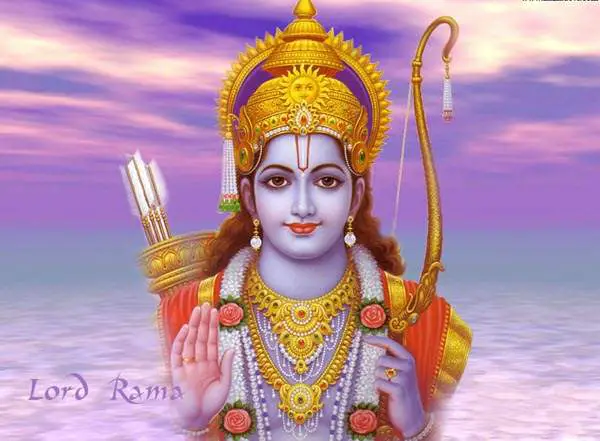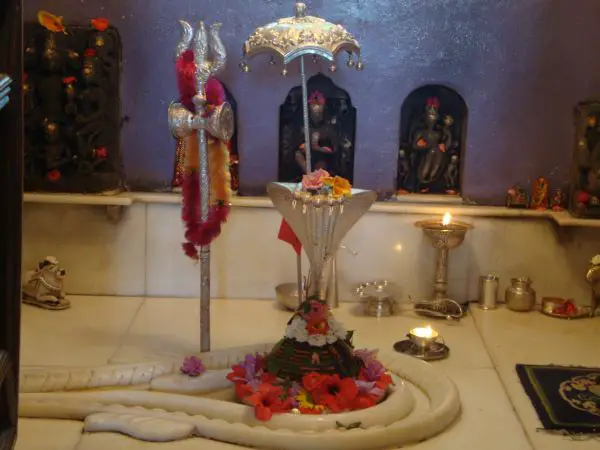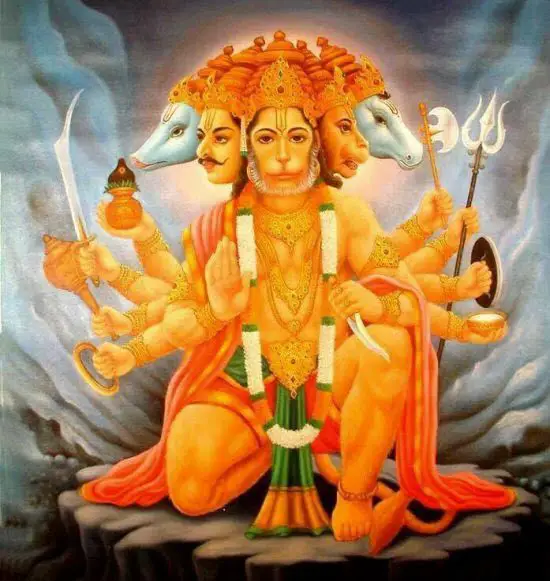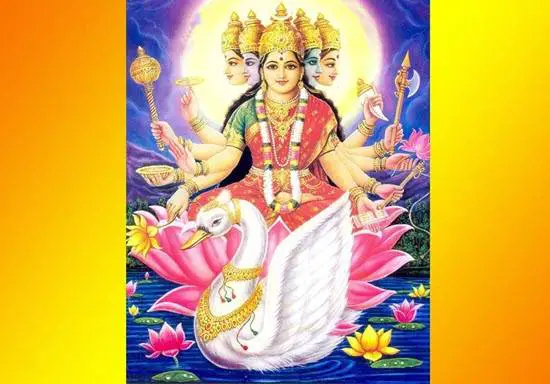The post shares with you interesting facts about the Hindu God, Lord Kartikeya also know as Murugan, and Subrahmanya.
Lord Kartikeya is the Hindu God of War and Commander of the Gods. He is the son of Goddess Parvati and Lord Shiva and brother of Lord Ganesh.
Lord Kartikeya is known by several names such as Murugan, Subrahmanya, Skanda, Shanmukha, Swaminathan and Kumaraswamy.
Lord Kartikeya is very popular with Tamil Hindus and predominantly worshiped in South India. He is often called “the God of the Tamils.”
Lord Kartikeya is also worshiped in Sri Lanka, Malaysia, Mauritius, Indonesia, and Singapore.
Many temples in Tamil Nadu are dedicated to him. The Kataragama temple in Sri Lanka is also dedicated to him.
In fact, Lord Kartikeya is an ancient Hindu God belonging to the Vedic era.
Many archaeological pieces of evidence dated around the 1st-century CE and earlier have been found that suggest Lord Kartikeya was a significant deity in early Hinduism.
Moreover, Lord Kartikeya is featured in many medieval Hindu temples all over India, including the Ellora and Elephanta Caves.
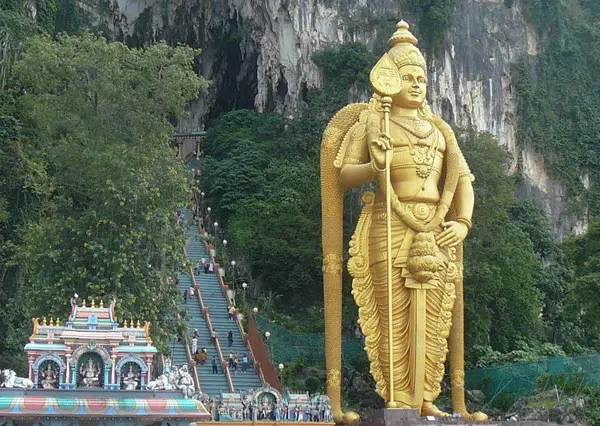
Table of Contents
The Iconography of Lord Kartikeya
Lord Kartikeya is regarded as one of the most beautiful looking God in the Hindu religion. He is portrayed as an ever-youthful man with a charm of its own. He possesses a calm and serene character. His face has the radiance of the full moon.
Lord Kartikeya is shown riding a peacock called “Paravani” and dressed with weapons. He holds his weapon Vel (lance) in his hand.
Mostly, Kartikeya Swami is shown with one head, but some show him with six heads and twelve hands carrying different weapons such as a sword, discus, bow, javelin, mace, etc.
Often, he is shown along with his two consorts namely Deivanai (Devasena) and Valli.
There is a legend surrounding his birth which states that he was nurtured by six mothers symbolizing the six stars of Pleiades (Kritikka in Sanskrit). So, Lord Kartikeya is often referred to as the six-headed God or “Shadaanana.”
Kartikeya grew up into a philosopher-warrior with extraordinary strength and skills. In fact, Kartikeya is called as the God of War who was the General of the Army of the Gods, the “Deva Senapati.”
He was extremely brave, intelligent, and highly skilled in the art of warfare. He overpowered and killed the demon Tarakasura.
The Story of the Birth of Lord Kartikeya
Once the Devas were suffering immensely at the hands of the demons Tarakasura and Surapadma, so, they prayed to Lord Shiva and requested him to save them.
Lord Shiva gave rise to a new manifestation of his power that would kill the demons. He generated six sparks from his eyes. These sparks were so hot that any other element in the creation could not bear it.
Eventually, Lord Agni was given the task to carry them forward.
However, Agni was also not able to bear the heat of these sparks. Therefore, he left them in a lake called Saravana.
The sparks took the form of six divine children.
Lord Shiva and Parvati were filled with immense happiness when they saw the children. They asked the Karthika (Kritikka) sisters to take care of the babies.
As Karthika sisters reared the children, so they were called as Kartikeya.
Parvati embraced all six children together. So, they got one single body with six heads. The child came to be called as Shanmuka (six faced Lord).
Goddess Parvati gifted the divine weapon “Vel” to Lord Kartikeya which he used to fight with the demons. Kartikeya emerged victorious in his fight against Tarakasura.
Kartikeya is the Guru of Lord Shiva
When Kartikeya was still a young child, Lord Shiva asked him to go to Lord Brahma and receive education from him.
So, Kartikeya went to Lord Brahma.
However, instead of learning the usual alphabets, Kartikeya was interested in knowing the meaning of “Om.”
So, he asked Lord Brahma, “Please tell me the meaning of Om.”
Although Lord Brahma knew everything about alphabets, he did not know the meaning of Om.
So, Kartikeya said to Lord Brahma, “I will not study under you as you do not know the meaning of Om.”
He went back to his father, Lord Shiva.
When Lord Shiva learned about this episode, he asked Kartikeya, “You must learn from Him as He is the Creator of the entire Universe.”
Kartikeya replied, “Please tell me the meaning of Om.”
Lord Shiva smiled and said, “Even I don’t know the meaning of Om.”
Kartikeya said to Lord Shiva, “I know the meaning of Om.”
“Tell me the meaning of Om as you know it,” said Lord Shiva.
“I will tell you the meaning of Om only when you place me on the pedestal of Guru,” said Kartikeya.
The Guru has to be on a higher platform, and the student must sit down and listen to him.
So, Lord Shiva lifted Kartikeya on to His shoulders. The young Kartikeya then explained the meaning of Om in His ear.
He narrated the essence and secret of Om to Lord Shiva. Kartikeya told Lord Shiva that the entire Creation is contained in Om.
Goddess Parvati was elated with joy when he saw Kartikeya narrating the meaning of Om to Lord Shiva. She exclaimed, “Now, you have become a Guru (Swami) to my Lord (Natha).”
Goddess Parvati addressed her son as, “Swaminatha.”
So, Kartikeya is also called as Swaminatha as he assumed the position of the Guru and explained the meaning of “Om” to his father, Lord Shiva.
Lord Murugan Wives
Lord Murugan has two wives.
His first wife is Valli, the daughter of a tribal chief. His second wife is Deivayanai or Devasena, the daughter of Lord Indra. She was gifted by Indra to Lord Murugan when he overpowered the demons.
His two wives namely Valli and Devasena refer to “Iccha Shakti” and “Kriya Shakti” which means the “Power of Will” and “Power of Action” respectively.
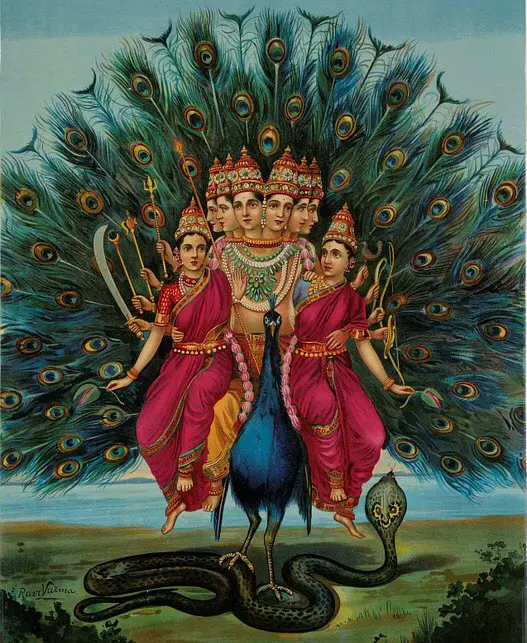
Who is the Elder one – Kartikeya or Ganesha?
Lord Kartikeya is hailed as the elder son of Shiva-Parvati by the vast majority of Indian populace.
Some Hindu Puranas indicate that Kartikeya was the eldest son of Lord Shiva and Goddess Parvati.
For instance, in the Brahma Vaivarta Purana, Kartikeya is portrayed as the elder son of Shiva-Parvati, and Ganesh as the younger son. Even Shiva Purana mentions that Kartikeya is the elder son of Shiva.
Moreover, Kartikeya was born to kill the demon Tarakasura who had the boon that Shiva’s son would only kill him. If Ganesha was the elder, he would have killed the demon Tarakasura. Eventually, Tarakasura was killed by Kartikeya.
However, there are many traditions which worship Lord Ganesh as the elder son as he is regarded as the “Pratham
So, we cannot make any concrete comment on who is the elder son of Shiva-Parvati.
However, if we go by popular belief, then Lord Kartikeya is regarded as the elder son of Shiva and Parvati by most of the Hindu traditions.
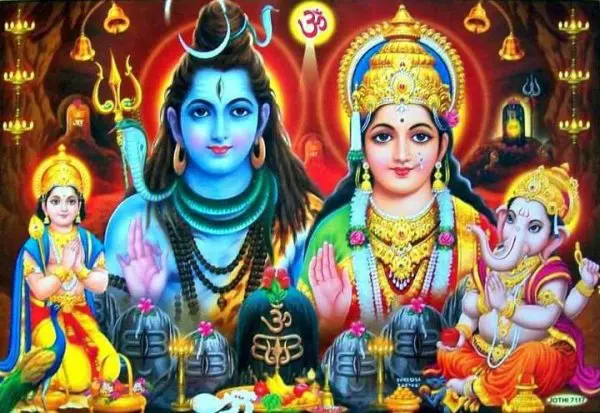
Festivals dedicated to Lord Kartikeya
Sharad Purnima which is celebrated as Kumara Purnima is one of the popular festivals dedicated to Lord Kartikeya. The festival of Kumara Purnima is celebrated on the full moon day after Vijayadashami.
It is a very popular festival in Odisha. On this day unmarried girls worship Lord Kartikeya to get grooms as handsome as Lord Kartikeya.
Another major festival dedicated to Lord Kartikeya is Thaipusam. It is said that Goddess Parvati offered a lance to Lord Murugan on this day so that he could overpower the army of demon Tarakasura. So, Thaipusam celebrates the victory of good over evil.
Skanda Shashti is yet another popular festival in honor of Lord Kartikeya. It is mostly celebrated in South India.
Skanda Sashti is celebrated on the sixth day of the bright fortnight in the Tamil month of Aipasi which falls in October or November.
It is said that Lord Kartikeya Swami overpowered and killed the demon Tarakasura on this day. So, it celebrates the destruction of evil by the Supreme Being.
108 Names of Lord Subrahmanya
(Lord Murugan Names)
Here, we list out 108 names of Kartikeya God with meaning:
- Om Shanmukhaya Namaha (Meaning – Praise be to the six-faced one)
- Om Skandaya Namaha (Meaning – Vanquisher of the mighty foes)
- Om Guhaya Namaha (Meaning – Praise be to the Invisible Lord)
- Om Balanetrasutaya Namaha (Meaning – Praise be to the Son of the Three-Eyed Siva)
- Om Prabhave Namaha (Meaning – Praise be to the Lord Supreme)
- Om Krittikasunave Namaha (Meaning – Hail to the Son of the starry maids)
- Om Pingalaya Namaha (Meaning – Praise be to the golden-hued one)
- Om Dvinadbhujaya Namaha (Meaning – Hail to the Lord with the twelve hands)
- Om Sikhivahanaya Namaha (Meaning – Hail to the rider on the peacock)
- Om Dvinannetraya Namaha (Meaning – Hail to the Lord with the twelve eyes)
- Om Saktidharaya Namaha (Meaning – Hail to the wielder of the Lance)
- Om Tarakasurasamharine Namaha (Praise be to the slayer of Tarakasura)
- Om Pisidasaprabhajanaya Namaha (Meaning – Praise be to the destroyer of the Asuras)
- Om Mattaya Namaha (Meaning – Praise be to the Lord of felicity)
- Om Raksobalavimardanaya Namaha (Meaning – Praise be to the Victor of the Asuric forces)
- Om Unmattaya Namaha (Hail Oh passionate One)
- Om Pramattaya Namaha (Meaning – Praise be to the Lord of bliss)
- Om Surasainyasuraksakaya Namaha (Meaning – Hail Saviour of the Devas)
- Om Devasenapataye Namaha (Meaning – Hail Commander of the Heavenly Hosts)
- Om Pragnya namaha (Lord of Wisdom)
- Om Bhaktavatsalaya Namaha (Praise be to Thee)
- Om Kripalave namaha (Hail Compassionate One)
- Om Saktidharaya namaha (Meaning – Mighty Lord – Praise be to Thee)
- Om Umasutaya namaha (Meaning – Son of Uma – Praise be to Thee)
- Om Krauncadharanaya namaha (Meaning – He who reft the Kraunca Mount asunder – Praise be to Thee)
- Om Kumaraya namaha (Meaning – Eternal youth – Praise be to Thee)
- Om Agnijanmane namaha (Meaning – To the effulgence of Fire)
- Om Senanye namaha (Meaning – Praise be to the Army Chief)
- Om Shankaratmajaya namaha (Thou Son of Sankara)
- Om Visakhaya namaha (Meaning – To Him who shone on the astral Visakha)
- Om Ganaswamine namaha (Meaning – The Lord of the Ganas)
- Om Sivasvamine namaha (Thou Preceptor of Siva)
- Om Sanatanaya namaha (Oh Lord eternal)
- Om Sarvasvamine namaha (God Almighty)
- Om Anantasaktaye namaha (Thou potent Lord)
- Om Aksobhyaya namaha (Meaning – Unsullied by arrows art Thou)
- Om Gangasutaya namaha (Son of Goddess Ganga)
- Om Parvatipriyanandanaya namaha (Thou beloved of Parvati)
- Om Atmabhuve namaha (Thou Unborn Lord)
- Om Sarodbhutaya namaha (Thou who didn’t nestle in the Saravana Lake)
- Om Mayadharaya namaha (Energy Art Thou)
- Om Pavakatmajaya namaha (Meaning – Thou who art born of Fire)
- Om Ujjrimbhaya namaha (Meaning – Praise be to the Invincible One)
- Om Prajrimbhaya namaha (Meaning – Praise be to the Auspicious One)
- Om Ekavarnaya namaha (Meaning – The one Word art Thou)
- Om Kamalasanasamstutaya namaha (Meaning – Praise be to the Lord extolled by Brahma)
- Om Trivarnaya namaha (Thou Art the Three)
- Om Dvivarnaya namaha (In Two Art Thou)
- Om Caturvarnaya namaha (In four Art Thou)
- Om Sumanoharaya namaha (Meaning – Thou Stealer of pure hearts)
- Om Pancavarnaya namaha (Meaning – In five letters Art Thou)
- Om Prajapataye namaha (Father of all Creation)
- Om Agnigarbhaya namaha (Thou who does sustain the fire)
- Om Trumbaya namaha (Oh Peerless One)
- Om Visvaretase namaha – Thou glory of the Absolute Paramasivam
- Om Samigarbhaya namaha – Hail Thou who arose out of the Vanni flame
- Om Hiranyavarnaya namaha (Thou resplendent One)
- Om Surarighne namaha – Subduer of the foes of the Devas
- Om Vasumate namaha – Thou Oh Splendour of the Vasus
- Om Subhakrite namaha – Thou Auspicious One)
- Om Vatuvesabhrite namaha (Oh lover of celibacy)
- Om Bhushane namaha (Thou Luminous Sun)
- Om Gahanaya namaha (Thou Omniscient One)
- Om Kapastaye namaha (Thou Effulgence divine)
- Om Kaladharaya namaha – Thou who adorns the crescent)
- Om Chandravarnaya namaha – Thou Radiance of the Moon)
- Om Mayadharaya namaha (Energy art Thou)
- Om Mahamayine namaha – Great Artist of Deception too art Thou
- Om Sahatatmakaya namaha (Art all-pervading)
- Om Kaivalyaya namaha (Everlasting joy of attainment)
- Om Visvayonaye namaha (Source of all Existence)
- Om Ameyatmane namaha (Supreme Splendour)
- Om Tejonidhaye namaha (Illumination divine)
- Om Anamayaya namaha (Savior of all ills)
- Om Parameshtine namaha (Thou art Immaculate Lord)
- Om Parabrahmane namaha (Thou Transcendent One)
- Om Vedagarbhaya namaha – The Source of the Vedas art Thou
- Om Viratsutaya namaha – Immanent Art Thou in the Universe
- Om Pulindakanyabhartre namaha – Praise be to the Lord of Valli)
- Om Mahasarasvatavradaya namaha (Meaning – Praise be to the source of Gnosis)
- Om Karanopatadehaya namaha – Thou who deigned embodiment for a cause
- Om Karanatita Vigrahaya namaha – Form transcending causal experience
- Om Anishvaraya namaha (Oh Eternal peerless plentitude)
- Om Amritaya namaha (Thou Ambrosia of Life)
- Om Pranaya namaha (Thou life of life)
- Om Pranayamaparayanaya namaha (Meaning – Thou support of all beings)
- Om Vritakandare namaha – Praise unto Thee who subjugates all hostile forces
- Om Viraghnaya namaha (Meaning – Thou vanquisher of heroic opponents)
- Om Raktashyamagalaya namaha (Meaning – Thou art Love, and of crimson beauty)
- Om Mahate namaha (Oh Consummation of glory)
- Om asrita Kiladhatre namaha – Praise be to Him who showers grace on those who seek his solace
- Om Choraghnaya namaha – Praise be to Him who annihilates those who steal
- Om Roganasanaya namaha (Meaning – Praise be to the divine Healer)
- Om Anantamurtaye namaha (Meaning – Praise be Thine whose forms are endless)
- Om Anandaya namaha (Praise be Thine)
- Om Shikhandikritagedanaya namaha (Praise be Thine)
- Om Dambhaya namaha (Meaning – Oh lover of gay exuberance)
- Om Paramadambhaya namaha (Meaning – Thou lover of supreme exuberance)
- Om Mahadambhaya namaha (Meaning – Oh Lord of lofty magnificence)
- Om Vrishakapaye namaha – Thou who art the culmination of righteousness
- Om Paravaraya namaha (Supreme Goodness)
- Om Subrahmanyaya namaha (Effulgent Radiance)
- Om Loka Gurave Namaha (Universal Teacher)
- Om Guhapriyaya Namaha – Indweller in the core of our hearts
- Om Aksayaphalapradaya namaha (Meaning – Bestower of indestructible results ineffable)
- Om Brahmanyaya namaha (Luminous wisdom serene)
- Om Brahmanapriyaya namaha – Thou who art beloved of seers
- Om Sri Subrahmanyaya namaha (Meaning – Most glorious effulgent Radiance)
Now, we have come to the end of this post on Lord Kartikeya. We hope that you would have found the post very useful. It shares some of the most interesting facts about Lord Murugan (Kartikeya). Thanks for visiting. Please share the post across popular social networks. We welcome your comments and suggestions.

